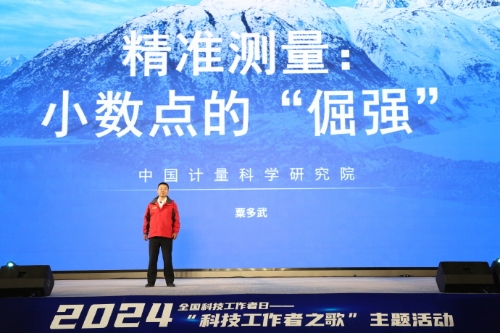Editor's Note:
A grand event was held at the Zhongguancun Exhibition Center in Beijing on May 30, 2024 to celebrate China's 8th National Science and Technology Workers Day. The event, titled "Song of Sci-tech Workers," was organized by the Beijing Association of Science and Technology (BAST) as part of a series of festivities running from May 1 to June 7. Six representatives from various fields of science and technology in Beijing were invited to share their stories of research and dedication at the event, showcasing the spirit of scientific innovation that helped drive Beijing to become a major global scientific center and innovation hub. These are the stories of these remarkable pioneers.
Su Duowu delivers a speech wearing the exact uniform he wore during China's 36th Antarctic expedition in 2019 at BAST's celebration event for China’s 8th National Science and Technology Workers Day on May 30, 2024. Photo: BAST
Su Duowu, a distinguished researcher from the National Institute of Metrology (NIM) in China, has been making significant contributions to the field of metrology, particularly in the precise measurement of gravitational acceleration. His work, alongside his team at the Division of Time and Frequency Metrology of NIM, has pushed the boundaries of accuracy in this critical scientific domain, achieving measurements precision to eight decimal places.
"Do you know how many decimal places current human measurements of gravitational acceleration can extend to?" he asked. "The answer is eight." This level of precision, far beyond the simplified value of 9.8 meters per second squared used in high school physics, has profound implications for various scientific and practical applications.
Su Duowu works at Zhongshan Station during China's 36th Antarctic expedition in 2019. Photo Courtesy of Su Duowu
Su Duowu poses for a photo at Zhongshan Station while participating in China's 36th Antarctic expedition in 2019. Photo: Courtesy of Su Duowu
Su has undertaken ambitious expeditions to remote and extreme environments to gather critical data. In 2019, he participated in China's 36th Antarctic expedition, tasked with establishing an absolute gravity calibration point at Zhongshan Station, China's second perennial scientific research station in Antarctica. This is a seemingly simple but challenging mission. The sensitive nature of absolute gravimeters, which can be disrupted by even the slightest vibrations from wind or ground movements, posed a significant challenge in the harsh Antarctic conditions.
During more than 110 days and nights working in Zhongshan Station from November 2019 to March 2020, Su spent over 70 days working with the instruments and equipment in the field tents. Despite the relentless cold, strong winds, and blizzards, Su and his team successfully gathered invaluable gravity data, contributing to the construction of a global gravity reference network. This achievement made China the second nation capable of developing and producing highly adaptive, advanced absolute gravimeters for extreme environments.
Another notable accomplishment was the gravity acceleration measurement on Mount Everest. In 2020, China announced the new official height of Everest as 8,848.86 meters, a figure influenced significantly by precise gravity measurements.
In May 2023, Su's team brought their NIM-3C absolute gravimeter to the Everest Base Camp at an altitude of 5,153.6 meters to conduct another gravity measurement. This expedition marked the first absolute gravity measurement at the base camp, a feat accomplished despite the logistical and environmental challenges posed by the high altitude and severe weather conditions.
Setting up the equipment in the thin air and extreme cold was a meticulous process, taking over two hours for a task that normally takes 30 minutes at lower mainland. The team's perseverance paid off when the gravimeter provided reliable data even under these harsh conditions. Su recalled the relief and excitement when the device successfully recorded measurements amid the snow and wind, a moment he equated to winning a medal in an international competition.
The precision of gravity measurements is critical for various scientific fields and practical applications. Gravity acceleration values can vary by latitude and altitude, impacting navigation, resource exploration, earthquake prediction, ocean monitoring, and crustal movement studies. For example, the gravitational acceleration value of 9.8 commonly used in China differs from the value at the equator, where it is around 9.7. Changes in the third decimal place can indicate altitude variations, while the fourth and fifth decimal places are crucial for detecting anomalies in the gravitational field that can reveal underground resources or archaeological sites.
Su emphasized that each advancement in gravity measurement precision drives progress in related scientific fields and technological innovations. The data obtained from these measurements can enhance the accuracy of scientific instruments and foster new developments in technology. By sharing his experiences and insights, Su hopes to inspire interest and support for scientific endeavors, underscoring the vital role of precise measurements in advancing human knowledge and capability.
Through his dedication and pioneering work, Su exemplifies the spirit of scientific exploration and the relentless pursuit of accuracy that drives the field of metrology. His contributions not only bolster China's standing in the global scientific community but also pave the way for future innovations that depend on precise measurement of the natural world.


